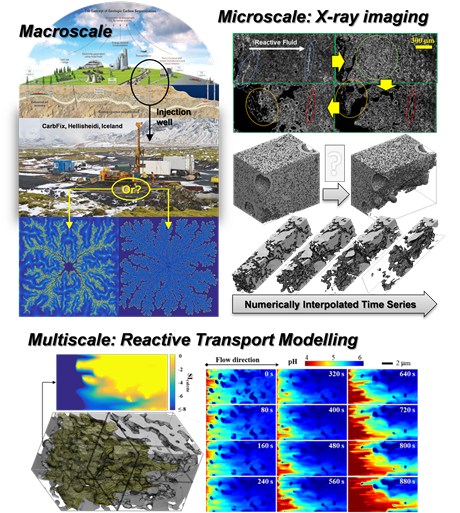Motivation
In the 2015 Paris accord, international leaders agreed that the world should act urgently to keep the Earth’s average temperature increases well below 2 oC by the year 2100 to avoid a host of catastrophic changes. However, in spite of all the good intentions, fossil fuels remain imperative sources of energy and raw chemical materials and their extraction and processing employ a very large number of people globally. A transitional solution is needed to cut anthropogenic CO2 emission sharply while allowing sufficient time to phase out the fossil fuel-dependent economy. Geologic carbon storage (GCS) is among the most promising means to achieve this goal. In GCS, CO2 is collected from power stations and chemical plants, compressed, and injected into geologic formations. Concentrated CO2 is acidic – it erodes rocks, develops new flow pathways and changes formation structures. Given the very limited maneuvering space for field engineers after CO2 is injected, it is crucial to develop predictive capacity to determine the factors governing the extent to which coupling between rock dissolution and fluid transport enhances or inhibits the overall efficiency of carbon storage, and to find favorable conditions for GCS. Building such capacity, however, is extremely challenging because it requires the modelling of immensely complex natural phenomena as an orchestrated interplay among physical and chemical processes on several length scales.
Read the complete project proposal here
Research Directions
You are encouraged to contact Yi Yang (yyan@kemi.dtu.dk) early to discuss your research interest and academic background. A concrete scientific question and associated research objectives will be laid out according to the outcome of such discussions. Currently, we offer two research directions:
X-ray imaging of porous microstructure: we develop sample environments that allow X-ray imaging of fluid-solid interactions under geologic carbon storage condition, which helps us understand the impact of acidic fluids, such as brine and CO2, on microstructural evolution. Background in physics or mechanical engineering is favored.
Reactive transport modelling: we develop mathematical models that describe the migration of reactive fluids in porous media. These models help us assemble knowledge of chemical kinetics, fluid flow and geologic materials, understand their interactions and to some extent predict the consequences of geological CO2 sequestration on various length scales. Background in geochemistry or mathematical modelling is favored.

Project Options
M.Sc./B.Sc. Projects based in the Department of Chemistry at Technical University of Denmark (DTU), in collaboration with Geological Survey of Denmark and Greenland (GEUS)